The 10 best dog treats 2025, tried and tested by real pups
These are the best dog treats based on taste, quality, value for money, and size.

The best dog treats are always handy to have in the cupboard - you never know when you might need them. Whether you're working on your pup's recall skills or teaching a new command, a tasty reward goes a long way when brushing up on training.
You might be wondering if treats are safe to feed alongside the best dog food and the answer is yes. Just make sure they don't make up more than 10% of a daily calorie intake. Rewarding your dog with a treat is a great way to offer positive reinforcement for dogs, so it's a good idea to find ones they love.
Some dog treats even have benefits, like cleaning plaque and tartar off their teeth. If your dog has a health condition, you might think that treats are off limits but that's not always the case. It goes without saying that you should run it past your vet first, but you might want to look into the best diabetic dog treats and the best dog treats for sensitive stomachs.
Vet Dr. Catherine Barnette says: "To help reduce the calories your dog receives from treats, consider breaking treats in half, using pieces of kibble as treats, or switching to healthier low-calorie alternatives. Doing so will reduce the risk of excess weight gain and ensure your dog remains healthy."
The best dog treats 2025
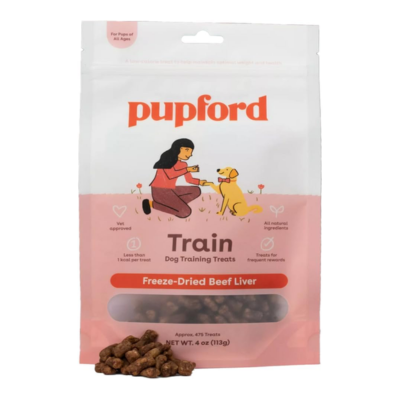
The best dog treats overall
With less than one calorie per bite, these tasty treats are an excellent choice for training (especially if your dog is on a diet). These protein-rich treats contain just three ingredients - beef liver, beef heart, and a natural antioxidant - perfect if you're looking for a limited-ingredient snack.
We gave these to our tester Isaiah for his dog Hayes to try. He reports back that they're his new favorite treat and are a suitable size for training. The smell is "mild" and "inoffensive" and can be easily stored in the original bag.
He says: "Hayes loved the treats. [...] He liked the taste of [all the flavors], and began jumping up and down whenever he saw the bag of the treats. The amount of treats never seemed to be enough; he could and would eat the whole bag if allowed. They are very easy to feed to any dog!"
Reason to buy: Limited ingredients, grain-free, suitable for all ages, suitable for training, low calorie.
Reason to avoid: They have a slight smell.
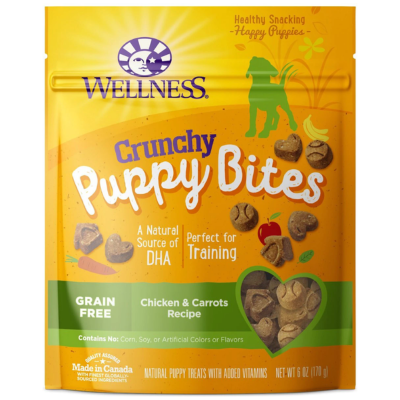
The best dog treats for puppies
These high-quality puppy treats come in small, bite-sized pieces, making them particularly good for training and little mouths.
Not only is chicken the number one ingredient, but these treats also contain a natural source of omega-3 (which is great for the brain and nervous system).
These treats get a thumbs up from our tester Michael and his dogs Tito and Petey. He says: "Petey seems to enjoy the taste of it. Initially, he was hesitant to try it until I gave it to my other dog, Tito, who eats just about anything. Petey eventually ate the ones I gave him, and now seeks it out. I will probably use them in some training I’m hoping to do as he seems receptive to it as a reward."
Reasons to buy: Odorless, grain-free, easy to store, suitable size for training, grain-free, affordable.
Reasons to avoid: Not suitable for dogs with chicken allergies.
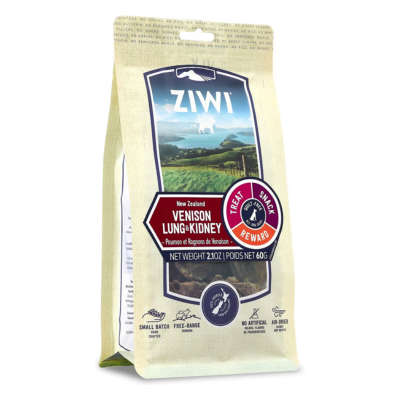
The best premium dog treats
These single-protein treats contain just two ingredients - venison lung and venison kidney. This means you won't find any preservatives, flavors or added carbs in them. We love how ZIWI uses free-range meat that's sourced from New Zealand.
So, what did our tester Sarah's dog think of them? "Duke LOVES these treats. He takes his time eating it and keeps asking for more. The treats are of very high quality and definitely worth the price! You also get a good amount of treats in the bag. They’re broken down into many different pieces so there’s a lot more in there than you think!"
She says: "It does have an unpleasant smell, it is pungent and gamey. However, the Ziploc seal ensures that the smell doesn’t escape and permeates the air after retrieving the treat."
Reasons to buy: Free-range meat, single protein, grain-free.
Reasons to avoid: Too big for training, irregularly sized, bad smell.
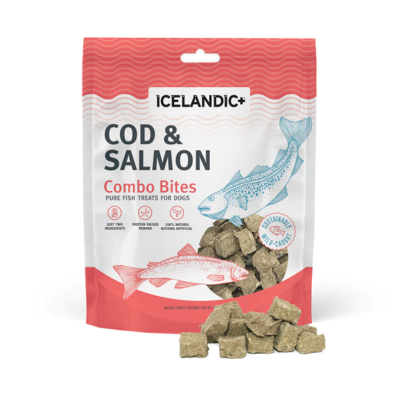
The best sustainable dog treats
These treats contain just two ingredients: cod and salmon, which are sustainably wild-caught. Icelandic+ uses geothermal energy in Iceland to air dry them and retain the nutrients.
Here's what our tester Mike had to say about them: "Rocky [the dog] loved them. The smell I’m sure helped entice him and he was pawing at the bags when they first arrived. He definitely was more eager to get these than any treats/training bits we’ve used before."
So, what about the smell? Mike says: "There is a strong fish smell but it dissipates quickly (once Rocky gobbled them up) and after the bag is sealed. The fishy smell would not be a deterrent to buy them as it helped quickly get Rocky’s attention."
Reasons to buy: Good size for training, two ingredients, sustainably sourced fish, high in omega fatty acids, free from preservatives, grain-free.
Reasons to avoid: Strong smell, not the cheapest option, hard to break up.
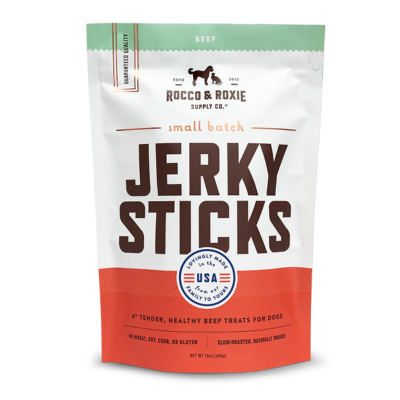
The best stick treats
Containing beef as the number one ingredient, these high-protein chewy treats are guaranteed to get your pup's attention.
Our tester Amanda gave them to her Russell terrier called Scout and says they're good value for money. Whilst they're not the best choice for training due to their large (6") size, she found that she could break them up into smaller pieces.
She says: "Scout loved the treats, she could smell them and would run over. I broke up the treats into smaller pieces since my doc is only 10 pounds. She would eat the treats quickly."
Although the strong smoky scent lingered on her hands, she says that it came off with a bit of soap and water.
Reason to buy: Good value for money, free from wheat, soy, corn, and gluten, resealable bag.
Reason to avoid: Too big for training small dogs, strong smell.
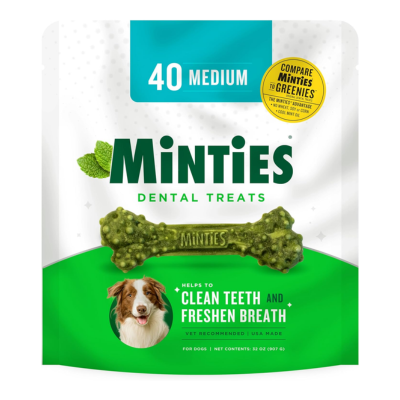
The best dental dog treats
A dog treat that tastes good and cleans teeth? We're sold. These dental treats help to remove tartar and plaque on the teeth, promoting a healthy mouth.
Amanda also put these to the test on her dog Scout. "My dog took it and hid it among her blankets. I think because it looked like a bone she got confused [about] the fact that it was a treat. We tried them again and it took her a second until she started to eat it. It took her about five to 10 minutes to completely eat the treat."
Are they good value for money based on the quantity and quality? Amanda says: "Yes and no, she finished the treat pretty fast. I put another one in the Kong toy to make her eat it slower. [...] I think it is good if you want to give your dog an extra special treat since its bigger than normal treats."
Reasons to buy: Free from wheat, corn and soy, no added sugars or salt, no artificial flavors, no animal by-products, no nasty smells.
Reasons to avoid: Not suitable for training.
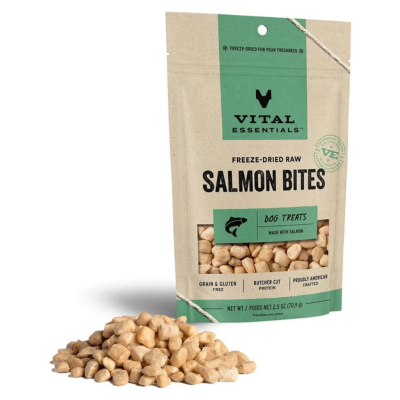
The best single ingredient treats
These single ingredient treats contain wild salmon from Alaska and are free from hormones and antibiotics.
Our tester Sarah gave them to her Siberian husky named Athena. She was impressed by how many "high-quality" treats you got for the price and that they're the perfect size for training.
She says: "My dog loves it! She gets excited when she knows these are the treats I’m rewarding her with. She has been so attentive and quick to respond when training with them. They are the perfect size for a quick reward. The smell isn’t unpleasant but it smells EXACTLY like salmon."
Reasons to buy: Single ingredient, good value for money, perfect size for training, gluten-free, grain-free, no fillers, no flavoring, no rendered by-products.
Reasons to avoid: Fishy smell.
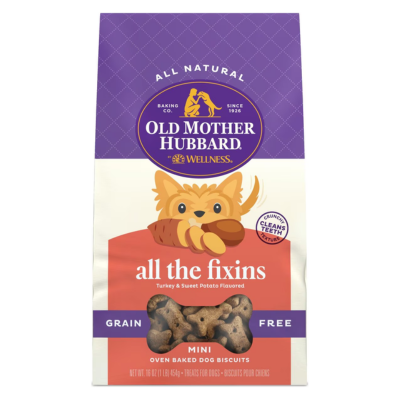
The best on a budget
These bone-shaped treats are a great choice for those on a budget and have lots of different flavors to choose from.
Nina says: "Milly [the dog] loves the All the Fixins and Chicken Pot Pie [flavors]. She eats those right away and wants more. She’s not as crazy about the P-nuttier n Nanners one, but she will still eat it eventually."
Since Milly is a small dog (weighing 12 pounds), Nina had to break the treats in half for her. This means they might not be the best if you're training a small dog (unless you don't mind breaking them up, of course!)
Whilst these treats are easy to store, Nina would prefer it if the bag was resealable.
Reasons to buy: Good value for money, grain-free.
Reasons to avoid: Too big for training, bag isn't resealable, protein isn't the number one ingredient.
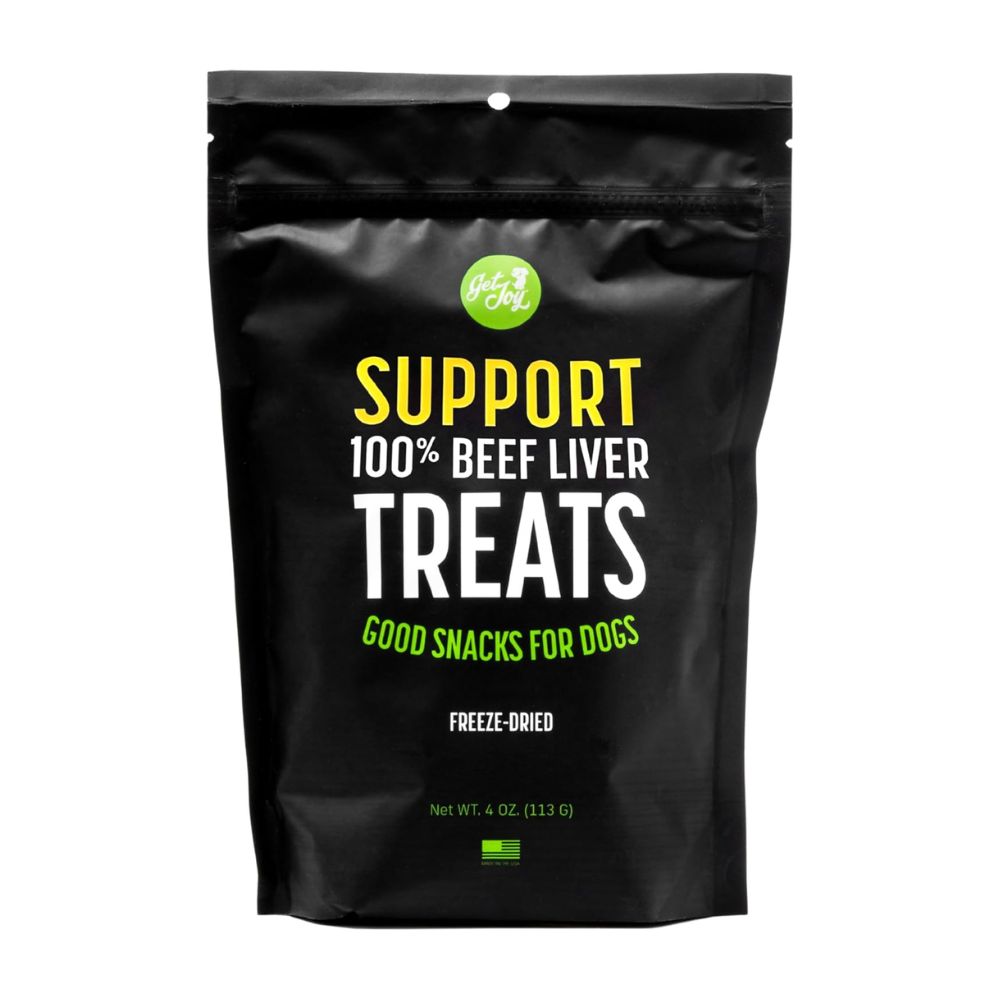
The best freeze-fried dog treats
These tasty treats are packed with protein, plus essential vitamins, minerals, and fatty acids which support your dog’s overall health. Since they’re freeze-dried, you won’t find any chemical additives or preservatives inside, but they still have a long, stable shelf life.
Our tester Sarah said: “Duke [the dog] loves them [...] and this seems to be his new favorite brand. They are very easy to chew, they almost melt in his mouth which is great because he’s a senior dog and has much more brittle teeth.
“They’re a bit bigger and chunkier than regular-sized treats and I think they should be given in moderation since they’re a bit nutrient-heavy. They have absolutely no smell, which is a HUGE plus as most liver/kidney/heart treats tend to have a strong odor and a slightly greasy texture [even despite being freeze-dried].”
Reasons to buy: No smell, no residue, good value, Ziploc bag is easy to store.
Reasons to avoid: Too big for training.
Load the next 2 products ↴
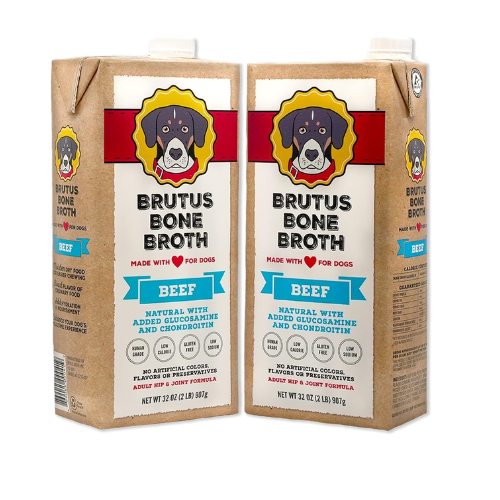
The best broth dog treat
This bone broth is high in protein and contains chondroitin and glucosamine, which are great for supporting joint health. You can use it as a topper on your dog’s everyday food, or mix it with water for a tasty treat.
Brutus uses human-grade ingredients and the recipe is free from artificial colors, flavors and preservatives. The packaging is recyclable, easy to store and won’t release any nasty smells inside of your fridge.
Our tester Lindsey says: “My dog loves it - she gets impatient and excited waiting for me to put it on top of her dry food. I think it would be especially helpful for dogs that aren’t as interested in eating dry food. The bone broth comes in a container like a chicken broth would, so I just keep it in the fridge and uncap it to pour it over her food.”
Reasons to buy: Contain chondroitin and glucosamine, doesn’t smell, easy to store, dog-approved.
Reasons to avoid: Not for training.
How we tested the best dog treats
When it comes to buying the best dog treats (or anything for that matter), you want to make sure it's worth your money. As pet owners ourselves, we understand what you're looking for and took various factors into consideration.
We consulted vet Dr. Rebecca MacMillan to find out how to choose a high-quality treat (read below). After getting her expert opinion, we scoured the internet and carefully selected our favorite products. We then called in our team of dog owners to put them to the test, asking them to comment on the following criteria:
Quality of ingredients: Dr. MacMillan recommends dog treats that have high-quality protein as the first ingredient. We kept this in mind when selecting these products - you'll find that most of these treats have just one or two protein-based ingredients. They also have minimal preservatives and additives (if any!)
Taste: It's a no-brainer that dog treats need to be tasty - especially if you're using them to reinforce good behavior. We asked our testers if their dogs enjoyed eating the treats, if they finished them and whether they seemed to want more.
Value for money: There's nothing worse than wasting your money on a bad product. That's why we asked our testers whether they think the treats are worth the price based on quality and quantity. Every dog deserves to be treated, so we tried to include a variety of price points to suit each budget.
Size: As Dr. MacMillan says below, if you're using treats for training, the smaller the better. We asked our testers whether the size of the treats are suitable for training.
Smell and storage: Whilst pet food is never going to smell particularly nice, we asked our testers to comment on the scent of the treat. This can't always be helped, but no one enjoys having smelly hands after feeding them! They also commented on how easy they are to store (like whether the bag is resealable or not).

How to choose the best dog treats
When choosing the best dog treat for your dog, there are a few things to bear in mind.
Special dietary requirements: If your dog has gum disease or is overweight, consider opting for a treat specific to them. A low-calorie treat for a dog who needs to watch their waistline means they don’t need to miss out on rewards, while a treat specifically aimed at fighting plaque will help dogs with gum and teeth problems get the best of both worlds.
Health needs: Similarly, for dogs with digestive issues, or just sensitive stomachs, try testing them out on one of the many dog treats on the shelves that specifically promise to be kind on digestion.
Ingredients: The same rules generally apply to dogs as they do for humans. The fewer and fresher the ingredients, the better.
Tastiness: Ultimately dogs will usually get the final say. But if you can manage to find a dog treat that your pet doesn’t turn their nose up at, and that has some great ingredients to supplement their diet, you’ll be in their good books forever.

Vet Dr Rebecca MacMillan says: "The principles behind choosing your pet’s training treats are similar to the ones I advise when you select the food for their main meals. This includes choosing a good quality product, ideally made with whole-food ingredients. It is best to avoid overly processed ingredients or lots of artificial colors and preservatives where possible.
"It is useful to know that the ingredients list on the packaging is ordered by weight, so the first ingredient on the list is present in the greatest quantity, the second is the second greatest quantity, and so on. The ideal treat would feature a high-quality protein item at the top of its ingredient list, so look out for this. Also, ingredients like ‘meat meal’ or ‘animal fat’ are a bit vague and could be from any source. A training treat that actually lists things clearly like ‘beef’ or ‘chicken fat’ gives us some more certainty about the product."
"When it comes to training treat size, the rule is the smaller the better! You will want to give your pet lots of praise and positive rewards during their training, and often this means plenty of treats. Therefore, choosing small treats (or ones that you can break up into smaller pieces) will help you avoid giving too many calories or causing nutritional imbalances in your pet’s diet. If your dog is overweight or more susceptible to weight gain, then I recommend choosing a low-calorie treat. This includes neutered dogs or those on restricted exercise for health reasons."
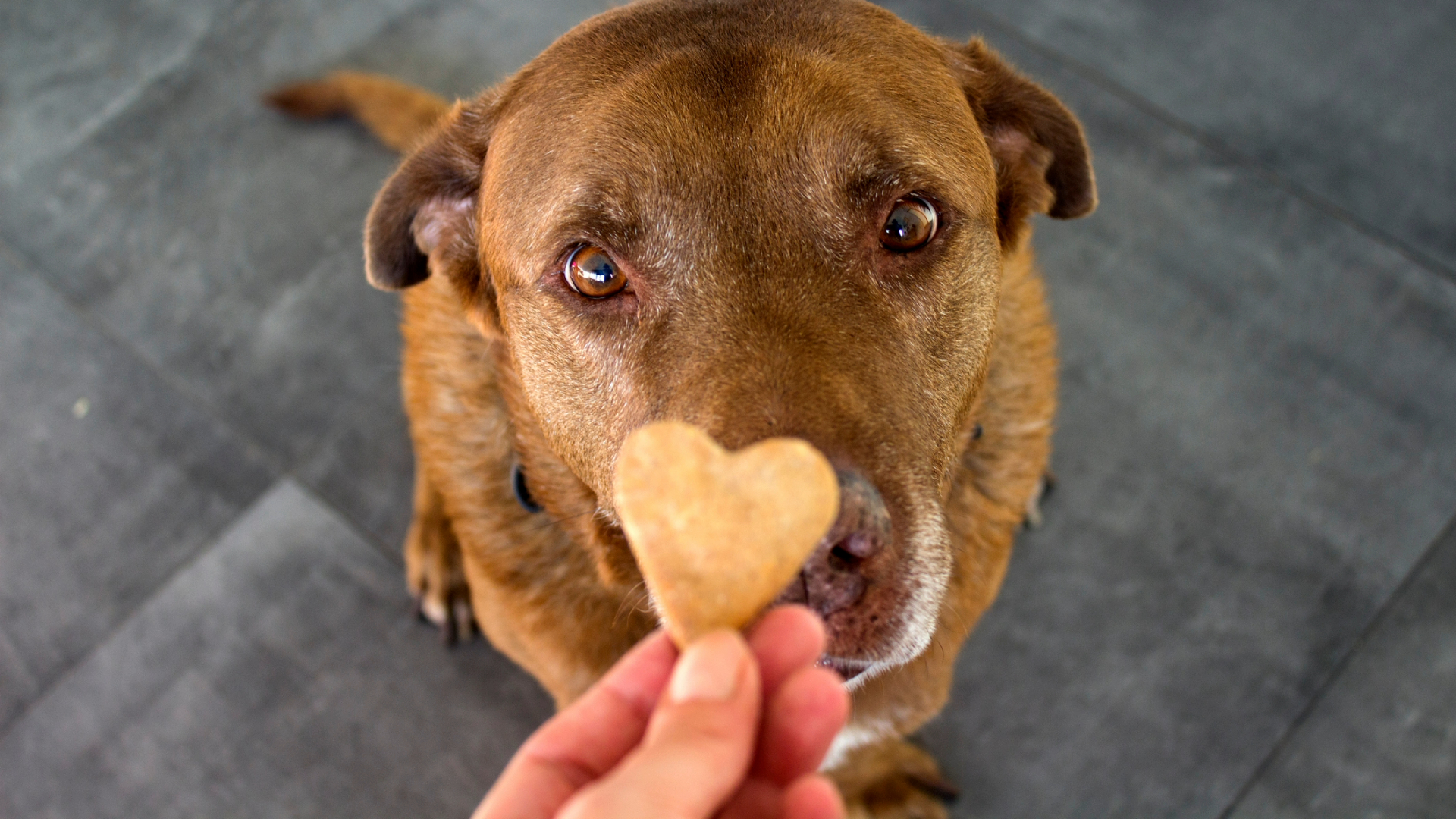
Are dog treats necessary?
You might be wondering, “are dog treats healthy?”. Not according to vet Dr. Catherine Barnette who says: “Your dog should primarily be eating a complete and balanced diet appropriate for his or her age and breed. While it’s okay to give treats occasionally, too many treats can lead to excess weight gain.”

Megan is Staff Writer on PetsRadar and graduated from the University of Westminster with a degree in BA Journalism. She covers everything from dog training tips to the best pet products. You'll often find her reading about new training techniques or trying out the latest pet gadgets. As a former dog owner, she knows that treats are one of the quickest ways to a pup's heart. However, with so many options, it can be hard to know what to choose. That's why she's rounded up the best dog treats, taking the ingredients into careful consideration.

Dr. Barnette is a graduate of the University of Florida, where she received both her B.S. in Zoology and her Doctor of Veterinary Medicine (DVM). She has 15 years of clinical experience as a small animal vet, treating dogs, cats, and occasional exotic patients. She now works as a freelance vet writer, creating educational content for vets, vet team members, and dedicated pet owners. Dr. Barnette lives in southwest Florida with her husband and daughter (plus two cats, a dog, and a rescued dove!) and enjoys kayaking, biking, and hiking.
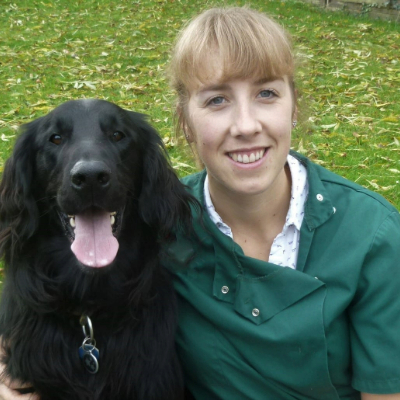
Rebecca is a vet surgeon who graduated in 2009 from the Royal Veterinary College in London. She has a wealth of experience in first opinion small animal practice, having done a mixture of day-to-day routine work, on-call emergency duties and managerial roles over the years. She enjoys medicine in particular and she is proud to have recently achieved a BSAVA postgraduate certificate in small animal medicine (with commendation). She writes on various feline and canine topics, including behavior, nutrition, and health. Outside of work and writing she enjoys walking her own dog, spending time with her young family and baking!
Get the best advice, tips and top tech for your beloved Pets

Megan is a Staff Writer at PetsRadar, covering features, reviews, deals, and buying guides. She has a wealth of experience caring for animals, having grown up with dogs, cats, horses, guinea pigs, and more throughout her life. She studied BA Journalism at the University of Westminster, where she specialized in lifestyle journalism and was editor of Smoke Radio’s lifestyle website. Megan works alongside qualified vets and accredited trainers to ensure you get the best advice possible. She is passionate about finding accurate and helpful answers to your pet-related questions.
